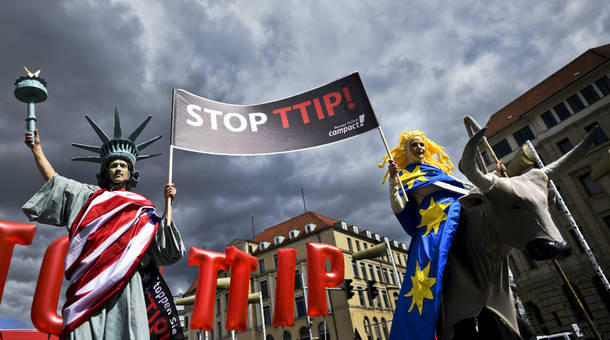-
Tips for becoming a good boxer - November 6, 2020
-
7 expert tips for making your hens night a memorable one - November 6, 2020
-
5 reasons to host your Christmas party on a cruise boat - November 6, 2020
-
What to do when you’re charged with a crime - November 6, 2020
-
Should you get one or multiple dogs? Here’s all you need to know - November 3, 2020
-
A Guide: How to Build Your Very Own Magic Mirror - February 14, 2019
-
Our Top Inspirational Baseball Stars - November 24, 2018
-
Five Tech Tools That Will Help You Turn Your Blog into a Business - November 24, 2018
-
How to Indulge on Vacation without Expanding Your Waist - November 9, 2018
-
5 Strategies for Businesses to Appeal to Today’s Increasingly Mobile-Crazed Customers - November 9, 2018
Further calls for ending of TTIP negotiations
The French position backs recent statements by Germany’s Economy Minister Sigmar Gabriel, who said that Obama’s free trade agreement with the European Union “is going nowhere”, stressing that talks between Brussels and Washington “have de facto failed”.
Advertisement
Free trade negotiations between the US and the European Union have “failed” because Americans are widely considered to be getting the better end of the deal, according to a German government official who blames the lack of progress regarding the Transatlantic Trade and Investment Partnership – or TTIP – on unfair terms for Europeans.
Speaking to RMC Radio, Matthias Fekl made clear he would request from his fellow ministers in Bratislava on September 22 to end TTIP negotiations; he also said that a clear end was the prerequisite for their relaunch.
Steffen Seibert also told reporters in Berlin it is “right to continue negotiating”, noting that often a breakthrough is only achieved in the final round. Bernie Sanders bolstered their support during the presidential race by strongly opposing trade deals, putting pressure on Democratic nominee Hillary Clinton to adopt a more skeptical stance on trade.
Fekl said the talks are weighted in favour of the Americans.
United States president Barrack Obama previously stated that if TTIP is not completed now it will be years before a trade deal can be negotiated, given a schedule of elections in the U.S. and across Europe.
TTIP has also not been helped by the Brexit vote in the United Kingdom, whose government has hitherto been one of the most vocal supporters of the plan.
The Austrian authorities worry that TTIP may potentially compromise food safety standards and threaten European businesses. Among the stumbling blocks is a USA objection to opening public tenders to European companies.
One of his main political tactics is to try to persuade the electorate that CETA is not a trailblazer for TTIP.
Ahead of elections in France and Germany next year, politicians are keenly aware that TTIP is not a vote victor.
“The U.S. has balked at accepting minimum European Union standards in the talks and unless that stance changes, I can’t see that it’s possible to seal the accord”, he said.
Gabriel not only faces opposition from the far left but from within his own party, which is governing in a grand coalition with Angela Merkel’s conservatives. Trade negotiations are conducted by the European Commission on behalf of all the member states.
Germany’s Gabriel on Tuesday said that “given the current state of the talks, no agreement is possible”.
Advertisement
In its election manifesto, Fianna Fail indicated its broad support for a deal, the section on TTIP begins, “Fianna Fáil supports the principle of removing barriers to trade”.





























